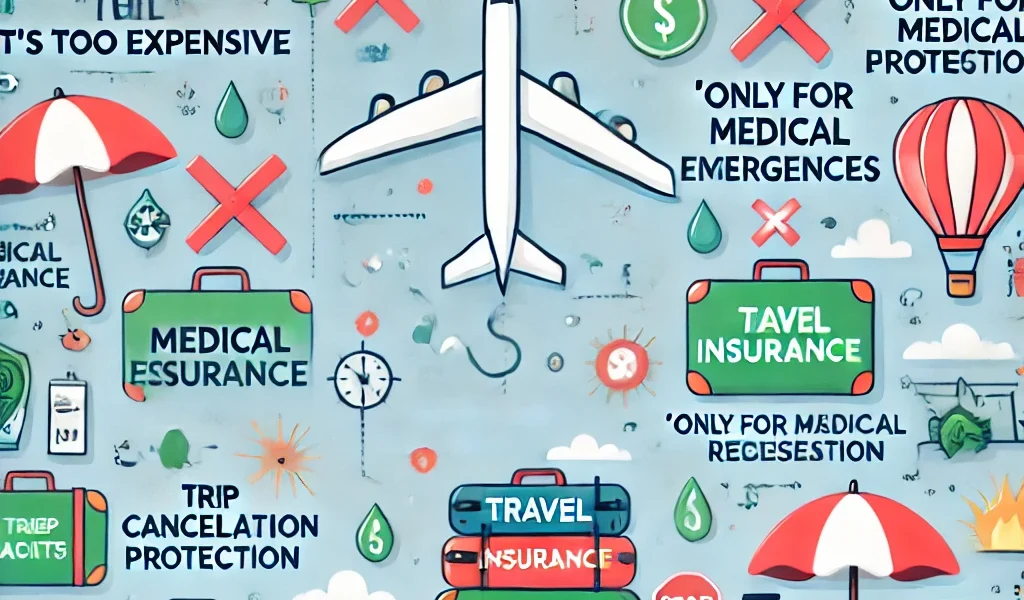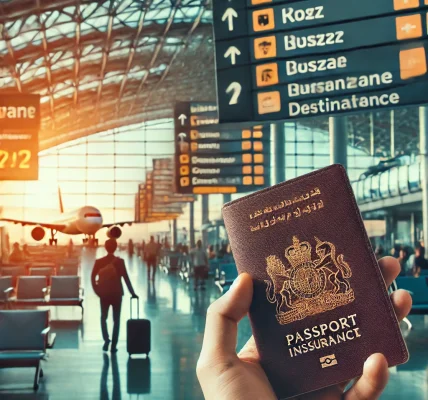Introduction
Travel insurance is often misunderstood, leading many travelers to make costly mistakes. Some believe it’s unnecessary, while others assume it covers everything. These misconceptions can leave you vulnerable during your travels.
In this guide, we will debunk the most common travel insurance myths, helping you make informed decisions for a worry-free trip.
Myth #1: “I Don’t Need Travel Insurance if I Have Health Insurance”
Reality: Your regular health insurance may not cover medical expenses abroad.
- Many domestic health insurance plans offer limited or no coverage outside your home country.
- Emergency medical treatments, hospital stays, and medical evacuation costs can be extremely high in foreign countries.
- Travel insurance ensures comprehensive coverage, including doctor visits, prescription medications, and repatriation.
💡 Tip: Check with your health insurer to confirm coverage abroad and invest in a travel medical insurance policy for extra protection.
Myth #2: “Travel Insurance Covers Every Cancellation”
Reality: Travel insurance covers cancellations only for valid reasons listed in the policy.
- Most policies cover cancellations due to illness, injury, death of a family member, natural disasters, or airline bankruptcy.
- Cancellations due to a change of mind, work-related issues, or visa denials are usually not covered.
- Cancel For Any Reason (CFAR) coverage allows more flexibility but comes at a higher premium and may have limitations.
💡 Tip: Read the cancellation policy carefully before purchasing to ensure it meets your needs.
Myth #3: “My Credit Card Provides Enough Travel Insurance”
Reality: Credit card travel insurance often has limited coverage and strict conditions.
- Many credit cards offer basic travel protections, such as trip cancellation or lost luggage coverage, but often require you to book the trip using that card.
- Credit card travel insurance may not cover medical emergencies, evacuation, or pre-existing conditions.
- Coverage limits are usually lower than a dedicated travel insurance policy.
💡 Tip: Always check the fine print of your credit card’s travel insurance and consider buying separate travel insurance for full coverage.
Myth #4: “Travel Insurance Is Too Expensive”
Reality: Travel insurance is affordable and can save you thousands in unexpected expenses.
- The cost of travel insurance typically ranges from 4% to 10% of your total trip cost.
- Medical emergencies, trip cancellations, or lost baggage can result in huge financial losses if uninsured.
- Some policies offer budget-friendly plans that cover essential risks without unnecessary add-ons.
💡 Tip: Compare different travel insurance plans online to find an affordable policy that meets your specific needs.
Myth #5: “I Can Buy Travel Insurance Anytime Before My Trip”
Reality: Buying travel insurance early provides maximum benefits.
- Some benefits, like trip cancellation coverage, only apply if purchased before an issue arises.
- Pre-existing medical conditions are usually covered only if you buy insurance within a certain period (e.g., 14-21 days) of booking your trip.
- Natural disasters or travel warnings announced after purchasing your policy may still be covered, but not if you buy insurance after the event is known.
💡 Tip: Buy travel insurance right after booking your trip to get full coverage.
Myth #6: “All Travel Insurance Policies Are the Same”
Reality: Travel insurance policies vary widely in coverage, exclusions, and benefits.
- Some policies cover only medical expenses, while others include trip cancellations, lost baggage, and emergency evacuation.
- Exclusions may differ—some plans may not cover adventure sports, pandemics, or political unrest.
- Policies may have different claim procedures, reimbursement percentages, and deductibles.
💡 Tip: Carefully read the policy details before purchasing and choose a plan tailored to your travel needs.
Myth #7: “Travel Insurance Covers High-Risk Activities Like Skydiving”
Reality: Many standard travel insurance policies exclude high-risk activities.
- Adventure sports like bungee jumping, scuba diving, skiing, or mountain climbing often require additional coverage.
- Policies may not cover accidents resulting from reckless behavior or intoxication.
- If engaging in extreme sports, ensure your policy includes adventure sports coverage.
💡 Tip: Always check the policy’s exclusions list and buy additional coverage if needed.
Myth #8: “Travel Insurance Will Refund Me Immediately”
Reality: Travel insurance claims take time and require proper documentation.
- The claim process can take weeks or even months, depending on the complexity of the case.
- Insurers require proof of loss such as medical reports, receipts, police reports, or airline confirmation documents.
- Some claims, like lost baggage reimbursement, may have waiting periods before approval.
💡 Tip: Keep copies of all receipts and documents and submit claims promptly to avoid delays.
Myth #9: “I Can’t Get Travel Insurance If I Have a Pre-Existing Condition”
Reality: Many insurers offer coverage for pre-existing medical conditions under specific conditions.
- Some policies cover pre-existing conditions if purchased within a specific period (e.g., 14-21 days of booking the trip).
- Travelers may need to declare their condition and provide medical documentation.
- Some insurers offer specialized policies for travelers with chronic illnesses.
💡 Tip: Be honest about your medical history when applying for insurance to avoid claim denial.
Myth #10: “I Don’t Need Travel Insurance for Domestic Trips”
Reality: Travel insurance provides valuable benefits even for domestic travel.
- Covers trip cancellations, baggage loss, and medical emergencies within your country.
- Protects you against hotel cancellations, rental car accidents, and trip interruptions.
- Medical coverage can be crucial if traveling to a remote area with limited healthcare access.
💡 Tip: Consider domestic travel insurance if traveling far from home, booking expensive accommodations, or engaging in adventure activities.
Conclusion
Travel insurance is an essential safeguard against unexpected travel disruptions. However, many misconceptions prevent travelers from making informed decisions. By debunking these common travel insurance myths, you can choose the right policy and travel with confidence.
Before your next trip, take the time to review different travel insurance options, read policy details, and select coverage that fits your needs.



